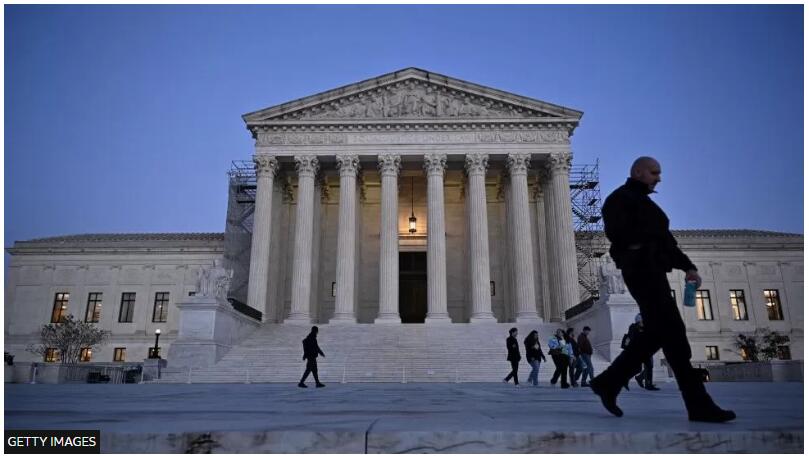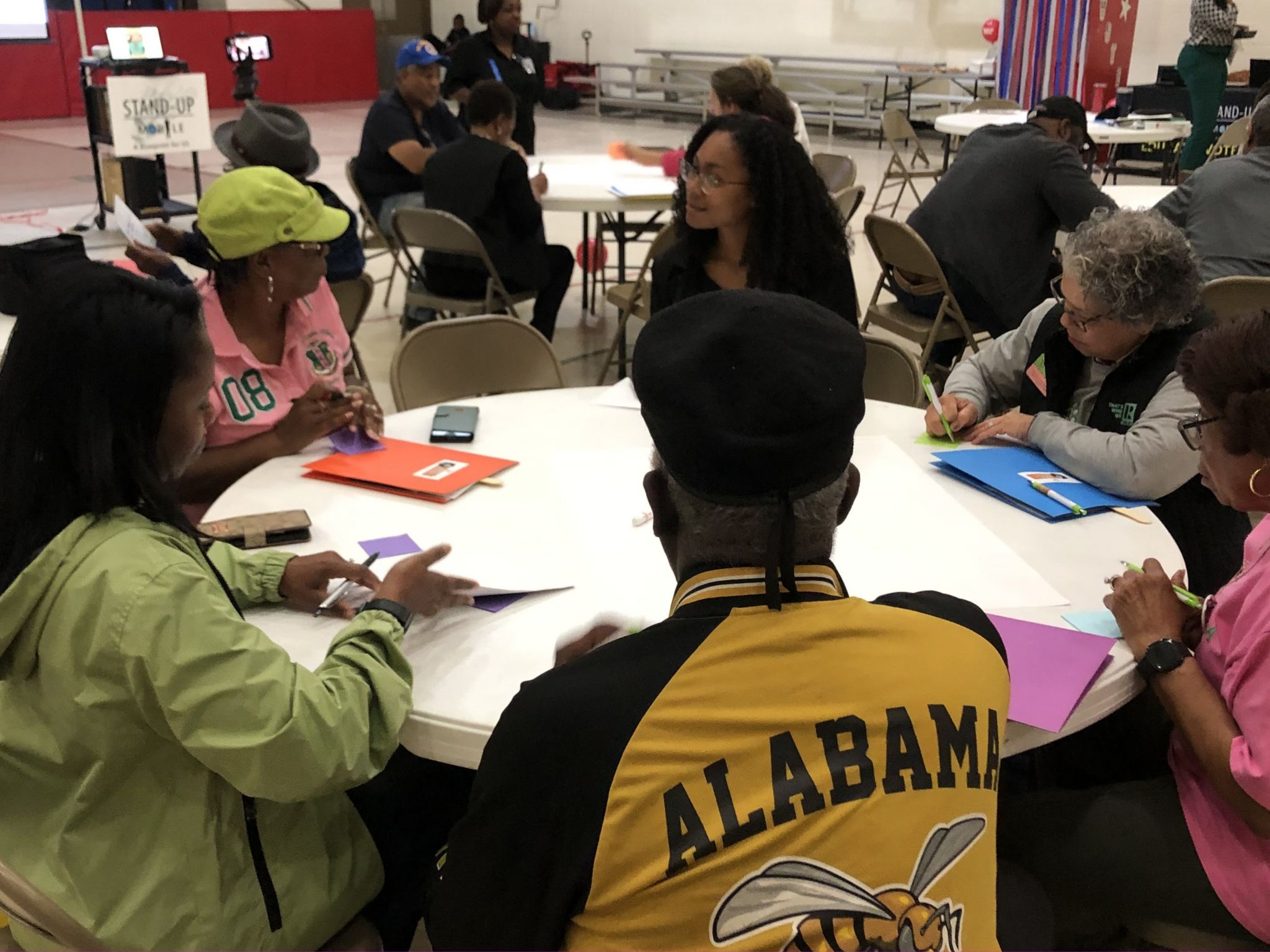
US court rolls back key voting rights protection
A US court dramatically rolled back key elements of a landmark civil rights act on Monday, blocking individual citizens’ ability to appeal against discriminatory voting practices.
The decision – approved in a split 2-1 vote by judges – is likely to be appealed before the Supreme Court, kicking off a fresh row over voting rights in the chamber.
Lawyers in Arkansas were appealing against a new congressional map – approved by the Republican dominated state legislature – which they said minimised the power of black voters.
But the 8th Circuit Court of Appeals struck down the claim, ruling that only the US Attorney General – not individual citizens – can pursue cases under the Voting Rights Act.
Under Section 2 of the landmark legislation it is illegal to discriminate against voters based on race.
As the extremely close 2024 election heats up, black voters in several states across the south, including Georgia, Florida and Louisiana, have filed lawsuits accusing the states’ lawmakers of diluting their voting power by redrawing maps along racial lines, which is known as racial gerrymandering.
In September, the Supreme Court ruled in favour of black voters in Alabama who sued the state for violating Section 2, and ordered state lawmakers to use a new map with an additional black-majority voting district.
The move was seen as a major victory for black voters in the state and some argued that it signalled a policy shift from the majority-conservative Supreme Court.
However, if the Arkansas ruling is upheld, black voters in other states could lose their ability to challenge instances of racial discrimination in voting.
It would impose higher hurdles on those seeking to tackle alleged violations of the Voting Rights Act by forcing them to convince the US attorney general in Washington DC to pursue the case.
In his dissent on Monday, Chief Judge Lavenski Smith observed that “rights so foundational to self-government and citizenship should not depend solely on the discretion or availability of the government’s agents for protection”.
Adding to the confusion is a recent decision by the 5th Circuit Court of Appeals. Earlier this month, the court upheld the rights of citizens to take claims under section 2 when hearing the case brought by activists challenging Louisiana’s new congressional map.
Where voters are divided
Voting rights advocates have long accused Republicans, particularly those in Deep South states like Arkansas, Alabama and South Carolina, of creating congressional maps that weaken the power of black voters.
Although gerrymandering has been used by both Democrats and Republicans in the past, in the south it has often targeted black or other minority populations.
That has led to a number of legal challenges brought by black voters who say these new maps strip them of a fair chance of electing their preferred candidates. Historically, voters of colour have been most likely to vote Democrat.
Momentum had swung in the favour of these challengers earlier this year, starting in Alabama.
In June, the US Supreme Court sided with a group of Alabama activists who said the state’s new congressional map was designed to reduce the voting power of black citizens. The court ordered the Republican-dominated legislature to redraw a map to create two predominantly black congressional districts.
The map, drawn by a court-appointed expert, created two voting districts with nearly 50% or above 50% black voting populations.
For the first time in Alabama history, the move could lead the state to elect two black Congress members.
“It’s a long time coming,” said Beverly Cooper, a Mobile, Alabama resident, told the BBC. “Now we have an opportunity to actually have representation in Congress and can elect those who recognize and know what our needs are.”
She added that the move granted black voters “an opportunity to have a different stake than what we’ve had in the past”.
However, the opportunity didn’t arrive for Mrs Cooper and other black voters in the state without Republican-led resistance.

When a lower court had found that Alabama’s old map diluted black voting power, state lawmakers appealed the decision to the Supreme Court, which also sided with the voters.
The court then ordered Alabama’s majority-Republican legislature to draw a new map that increased black voting power. The state’s lawmakers failed to do so. The court then appointed someone else to do it instead, prompting judges on the case to say they were “deeply troubled” by the state’s behaviour.
Elliot Mincberg, senior counsel at Washington Lawyers’ Committee for Civil Rights and Urban Affairs, said the legal drama was a “classic example” of “massive resistance”, a term coined in the 1950s to describe how southern states resisted court orders to desegregate.
“It became known under the term massive resistance of just resisting everything that the federal courts ordered no matter what, and trying to retain the old system,” Mr Mincberg said.
Several other states, when faced with similar orders to redraw their congressional maps, have mounted equally stiff legal opposition.
In Florida, a state judge ruled in September that a redistricting map promoted by Republican lawmakers was unlawful and needed to be redrawn because it decreased the strength of black voters in one district. The case now sits in a federal appeals court.
And a similar case out of South Carolina now sits before the Supreme Court, who must decide if they agree with a lower court’s ruling that the state’s map is racially discriminatory.
A surprise ally… for now
The Supreme Court’s Alabama ruling gave black voters an unexpected dash of hope, a hope which could be short lived, in light of the Arkansas ruling.
Voting-rights advocates are paying close attention to these cases to see if the country’s top court will further strengthen the Voting Rights Act – or if its decision in Alabama was a one-off.
“[Alabama] was particularly surprising from a court that, for a number of years, has weakened the Voting Rights Act,” Mr Mincberg observed.
In 2013, the court voted 5-4 to remove a protection provided by the Voting Rights Act which required federal approval for voting laws changes made by states with a history of voting discrimination.
It’s the historical tug-of-war for voting rights equality that feeds into Howard University political science professor Mr Boyd’s “gloomy” outlook over the Supreme Court’s future decision making.
The Supreme Court has already expressed scepticism over allegations of racial gerrymandering in the South Carolina case.
If the Arkansas case makes it to the country’s top court, and the conservatives adopt the thinking of lower courts, it could hinder black voters’ ability to fight for voting rights equality.
Justice Neil Gorsuch, supported by fellow conservative Justice Clarence Thomas, has already questioned whether private parties could take cases under the voting rights act in a 2021 opinion.
But Mr Boyd remains hopeful, even if Alabama is an outlier.
“[The Alabama case] reveals that America still has the possibility of becoming a nation for all people, regardless of their race, gender, creed, or religious status.”
Comments (0)